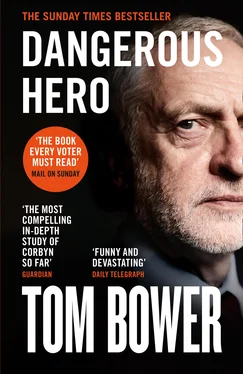In October 1974, Harold Wilson called another election. With Irving Kuczynski standing once again as Labour’s candidate, Corbyn’s energetic campaigning, supported by the prime minister visiting the constituency, reduced Hugh Rossi’s Tory majority to 782 votes, both a success and a disappointment for Corbyn. Wilson returned to office with a narrow parliamentary majority of three.
Although electioneering was over, Corbyn remained in perpetual motion. Leaving home early in the morning, he would bounce between council meetings, Labour Party gatherings, demonstrations, leafleting and occasional trips to the AUEW’s office to justify his salary. His pride and joy was Hornsey Labour Party. Nominally only the ‘assistant/minutes secretary’, he had swelled the local party’s membership, making it, he asserted, the second largest in the country. The huge influx was divided between moderates and committed hard leftists, who attracted the attention of MI5, the domestic security agency. The branch’s agenda reflected Corbyn’s priorities. Shortly after the general election, three resolutions were passed: to condemn the exploitation of tea-pickers by British companies; to deplore the imprisonment of twenty-one Iranian students after a sit-in at the Iranian embassy in London; and to support the boycott by the Labour leader of Hornsey of a visit by Prince Philip to open a new housing development. ‘I believe you’ve got to stand by your principles,’ Corbyn told the local newspaper. He also put forward motions in Haringey council meetings to impose import controls, restrict individuals spending money abroad, and to oppose Britain’s continued membership of the Common Market. There were no motions to deplore Haringey’s poverty, low rates of income, or the council’s failure to build more homes.
The inspiration for many of Corbyn’s ideas was Tony Benn, the new industry minister. Born in 1925 to an aristocratic family, Benn had been elected an MP in 1950, and was a social democrat as a minister during Wilson’s first term. By 1974, he was moving far to the left. One of a number of Labour Members disillusioned with Wilson’s excessive caution in promoting a socialist agenda, he became popular among Marxists, regularly visiting militant shop stewards at shipyards and factories to encourage class consciousness. At those meetings he railed against Britain’s membership of the European Common Market as a threat to parliamentary sovereignty. European socialists were condemned as revisionists, while East European communists were praised. To build socialism, in 1975 Benn created the National Enterprise Board (NEB) to take over Britain’s biggest twenty-five corporations and nationalise the City’s financial institutions. NEB officials, Benn believed, could manage industry in the public interest. To demonstrate the success of socialism, he diverted taxpayers’ money to support unprofitable corporations.
Among the beneficiaries was British Leyland in Birmingham, one of Britain’s biggest car producers. Neither Benn nor Corbyn understood Leyland’s plight. The company had been managed for years by Donald Stokes, a corrupt salesman, while its managers had ignored their foreign competitors’ technical improvements. Their attention was too often focused on surviving the anarchy on the production lines. Leyland’s Longbridge plant was blighted not only by ruinous restrictive practices imposed by competing trade unions, but also by daily strikes. These were organised by Derek ‘Red Robbo’ Robinson, a towering Marxist shop steward who apparently delighted in furthering the ruin of Britain’s motor industry. Neither Corbyn nor Benn ever criticised Robinson. In their world, trade unions were sacred. To that end, on the AUEW’s behalf Corbyn presented Benn with a blueprint to reconstruct the motor industry by increasing shop stewards’ powers. Benn was delighted with Corbyn’s work, an accurate reflection of its limitations. Neither considered the consequence of the constant strikes: defective products. For the first time since 1945, Germany and France produced more cars than Britain, and the country’s vehicle imports rose from 14 to 57 per cent of the market. Neither Benn nor Corbyn was alarmed. ‘He immatured with age,’ was one of Wilson’s less offensive comments about Benn.
As Jane Chapman discovered, her husband’s grasp of economics at the national level was no better than his understanding of their domestic finances. His lack of interest in money was reflected by his complete silence about improving their standard of living. He never talked about buying a bigger home, a car or increasing his income. He had few material requirements. To her surprise, since they had married so soon after meeting, when he returned home at night he would happily open a can of beans, swallow them cold and declare himself satisfied. Occasionally he returned late from a meeting of the Hornsey Labour Party with friends to sing IRA songs while they all got drunk on beer. He would sit on the floor in his greasy, unwashed pea-green jacket, bought at an army surplus shop in Euston, oblivious to her irritation. They rarely went out together. Invitations to dinner with the Venesses were refused. Corbyn, they were told, did not socialise.
Chapman spent lonely evenings in their small flat with Mango, the dog, and Harold Wilson, the cat, as her only companions while Corbyn went about extending his circle of political contacts. Among them was Tariq Ali, a Marxist intellectual originally from Pakistan, and Bernie Grant, a bombastic Black Power Marxist from Guyana and a Haringey councillor. ‘It’s racism to control immigration,’ Grant told Corbyn, adding that it was discriminatory to prevent anyone from the West Indies from settling in Britain. Corbyn adopted that opinion. Similarly, he did not openly protest about Grant’s view that boys and girls should be segregated in school, and that girls should be sent home when they were menstruating. Grant’s interest in questions of race was inconsistent, however: asked by Reg Race about the cultural oppression of immigrant women in Tottenham, he replied: ‘I don’t know and I don’t care.’ In their conversations, Grant and Corbyn rarely mentioned economic or social policies. They focused on community and ethnicity, subjects that were not only congenial to Corbyn, but at the heart of his political ideology. Anti-capitalist and disdainful of markets, he wanted citizens to live together in Soviet-style communes or self-supporting districts, as he had seen in Jamaica and South America. Joining in the black-and-white battle of morality against immorality, of good versus bad, underpinned his feelings of self-worth. Thanks to Grant, he was appointed chairman of the council’s new Community Development Sub-Committee, with responsibility for using public money to build community centres for immigrant groups. Within a year he was accused of ‘reckless spending’ by his fellow councillors, and of recruiting ‘community workers’ without giving them specific jobs. To Haringey’s Tory councillors, permanently in opposition but nevertheless vocal critics, Corbyn appeared to be signalling that he was left-wing on all issues, despite his lack of any coherent programme.
Mirroring Tony Benn, he agreed with the government’s response to rocketing oil prices. To avoid inflation, the American and German governments had cut spending, but Denis Healey, the British chancellor, did the opposite, increasing public spending by 31 per cent in his first year, and by 29 per cent the following year. Most of the money went to state employees, whose wages rose by 32 per cent. To Corbyn’s glee, Healey simultaneously raised income taxes for top earners to 83 per cent, and added an extra 15 per cent tax on unearned income. Some individuals were paying between 92 and 101 per cent in taxation. Healey’s mantra, ‘Squeeze the rich until the pips squeak,’ matched Corbyn’s nostrums. Both men seemed oblivious to the consequences. While inflation in Germany was 7 per cent, in Britain the figure soared to 27 per cent. Rather than face Labour’s punitive taxes and lose their savings to hyperinflation, thousands of the country’s most talented professionals, scientists and engineers emigrated to America and the Far East in what was called ‘the brain drain’, a phrase coined in 1960. The loss to Britain was little short of catastrophic. By the end of 1975, Wilson’s schemes to control capitalism had crippled private investment and Britain was on the brink of bankruptcy. Joe Haines, his media spokesman, later summed up Labour’s policies as ‘trying to make water run uphill – against the facts, against events, against common sense and against human nature’.
Читать дальше










